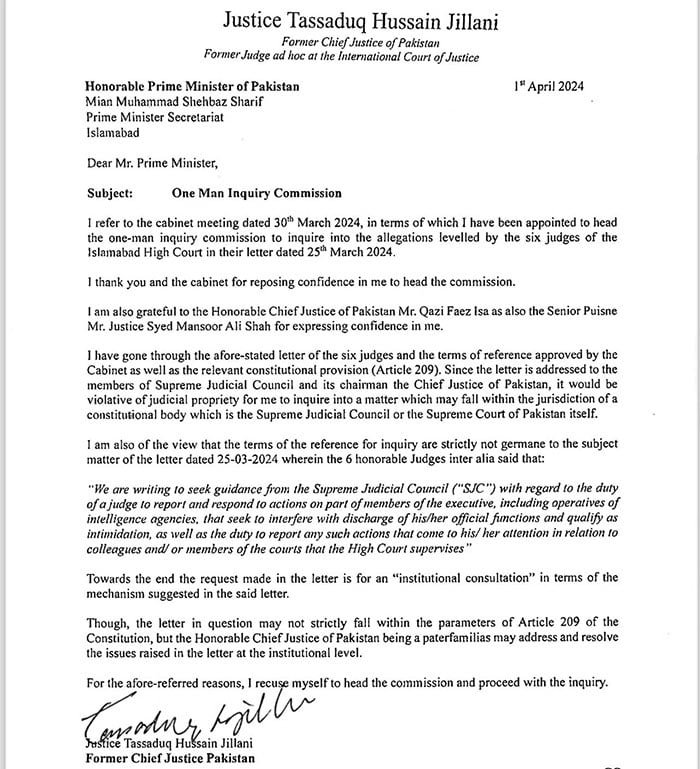Former Chief Justice of Pakistan, Tasadeq Hussain Jilani, has tendered an apology for his role as the chair of the inquiry commission tasked with investigating the letter issue involving six judges of the Islamabad High Court. In a letter addressed to Prime Minister Shehbaz Sharif, Justice (Retd) Jilani expressed regret and apologized for his involvement in the commission.
Acknowledging the Prime Minister, Cabinet, Chief Justice of Pakistan Qazi Faiz Isa, and Justice Mansoor Ali Shah, the most senior judge of the Supreme Court, Justice (Retd) Jilani conveyed his gratitude while expressing remorse for his decision to chair the commission.
In a conversation with Geo News, Justice (Retd) Tasadeq Hussain Jilani disclosed his reservations regarding the Terms of Reference (TOR) of the commission, as outlined in the letter submitted by the judges to the Supreme Judicial Council. He highlighted the absence of a proper forum for conducting inquiries into the matter, indicating a discrepancy between the allegations raised in the judges’ letter and the parameters set forth in the TOR.
Furthermore, Justice (Retd) Jilani emphasized that the allegations mentioned in the judges’ letter were not explicitly covered within the scope of the TOR. He asserted that the issues raised did not fall under the purview of parameter 209, raising concerns about the suitability of the commission’s mandate to address the grievances outlined by the judges.
The Federal Cabinet had approved the appointment of Justice (Retd) Tasadeq Hussain Jilani as the head of the one-member inquiry commission tasked with investigating the judges’ letter issue just two days prior. However, in light of his reservations and the perceived limitations of the commission’s mandate, Justice (Retd) Jilani opted to step down from his role as the commission’s chair.
The decision by Justice (Retd) Tasadeq Hussain Jilani to apologize and relinquish his position underscores the complexities and sensitivities surrounding the judicial inquiry. It reflects a commitment to upholding the principles of fairness, transparency, and accountability within the legal framework of Pakistan’s judiciary.
As the issue continues to unfold, stakeholders will closely monitor developments and await further action from relevant authorities. The resignation of Justice (Retd) Jilani raises questions about the next steps in addressing the concerns raised by the judges and ensuring the integrity of the judicial process moving forward.




